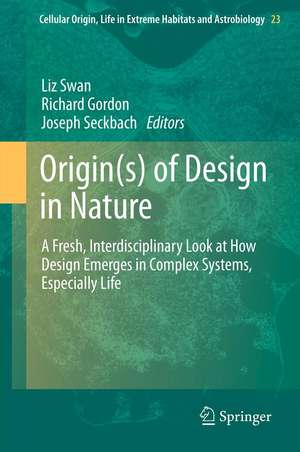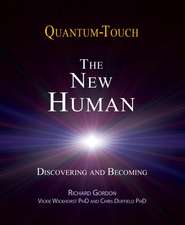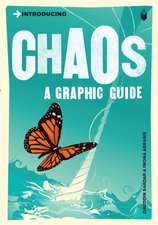Origin(s) of Design in Nature: A Fresh, Interdisciplinary Look at How Design Emerges in Complex Systems, Especially Life: Cellular Origin, Life in Extreme Habitats and Astrobiology, cartea 23
Editat de Liz Swan, Richard Gordon, Joseph Seckbachen Limba Engleză Hardback – 26 aug 2012
| Toate formatele și edițiile | Preț | Express |
|---|---|---|
| Paperback (1) | 1078.36 lei 38-45 zile | |
| SPRINGER NETHERLANDS – 23 aug 2016 | 1078.36 lei 38-45 zile | |
| Hardback (1) | 1263.01 lei 6-8 săpt. | |
| SPRINGER NETHERLANDS – 26 aug 2012 | 1263.01 lei 6-8 săpt. |
Din seria Cellular Origin, Life in Extreme Habitats and Astrobiology
- 18%
 Preț: 1683.66 lei
Preț: 1683.66 lei - 5%
 Preț: 1440.04 lei
Preț: 1440.04 lei - 18%
 Preț: 1839.32 lei
Preț: 1839.32 lei - 18%
 Preț: 1848.33 lei
Preț: 1848.33 lei - 18%
 Preț: 1839.32 lei
Preț: 1839.32 lei - 18%
 Preț: 1222.27 lei
Preț: 1222.27 lei - 18%
 Preț: 1232.26 lei
Preț: 1232.26 lei - 18%
 Preț: 2098.03 lei
Preț: 2098.03 lei - 18%
 Preț: 1228.29 lei
Preț: 1228.29 lei - 18%
 Preț: 2111.46 lei
Preț: 2111.46 lei - 24%
 Preț: 1076.36 lei
Preț: 1076.36 lei - 18%
 Preț: 1828.11 lei
Preț: 1828.11 lei - 18%
 Preț: 951.14 lei
Preț: 951.14 lei - 18%
 Preț: 1219.94 lei
Preț: 1219.94 lei - 18%
 Preț: 1235.08 lei
Preț: 1235.08 lei - 18%
 Preț: 1252.76 lei
Preț: 1252.76 lei - 18%
 Preț: 956.50 lei
Preț: 956.50 lei - 18%
 Preț: 956.03 lei
Preț: 956.03 lei - 18%
 Preț: 1234.46 lei
Preț: 1234.46 lei - 18%
 Preț: 1122.58 lei
Preț: 1122.58 lei - 15%
 Preț: 646.11 lei
Preț: 646.11 lei - 18%
 Preț: 1840.91 lei
Preț: 1840.91 lei - 18%
 Preț: 1231.16 lei
Preț: 1231.16 lei - 18%
 Preț: 1251.50 lei
Preț: 1251.50 lei - 18%
 Preț: 961.41 lei
Preț: 961.41 lei
Preț: 1263.01 lei
Preț vechi: 1540.26 lei
-18% Nou
Puncte Express: 1895
Preț estimativ în valută:
241.69€ • 252.66$ • 204.24£
241.69€ • 252.66$ • 204.24£
Carte tipărită la comandă
Livrare economică 07-21 martie
Preluare comenzi: 021 569.72.76
Specificații
ISBN-13: 9789400741553
ISBN-10: 9400741553
Pagini: 500
Ilustrații: XXVII, 812 p. 132 illus.
Dimensiuni: 155 x 235 x 38 mm
Greutate: 1.75 kg
Ediția:2012
Editura: SPRINGER NETHERLANDS
Colecția Springer
Seria Cellular Origin, Life in Extreme Habitats and Astrobiology
Locul publicării:Dordrecht, Netherlands
ISBN-10: 9400741553
Pagini: 500
Ilustrații: XXVII, 812 p. 132 illus.
Dimensiuni: 155 x 235 x 38 mm
Greutate: 1.75 kg
Ediția:2012
Editura: SPRINGER NETHERLANDS
Colecția Springer
Seria Cellular Origin, Life in Extreme Habitats and Astrobiology
Locul publicării:Dordrecht, Netherlands
Public țintă
ResearchCuprins
Introduction.- Foreword.- Preface.- PART I: Origin of Design.- The Initial Low Gravitational Entropy of the Universe as the Origin of Design in Nature.- On the Biological Origin of Design in Nature.- Creativity in Nature.- PART II: Philosophical aspects of design.- Plato’s Pythagorean Cosmos: Order and Chaos in the Intelligence of Natural Design.- War or Peace? Huxley and Kropotkin’s Battle Over the Design of Virtue.- Free Will in God’s Dice Game.- Does Biology Need a New Theory of Explanation? A biological perspective on Kant’s Critique of Teleological Judgment.- Pragmatism, Inquiry, and Design: A Dynamic Approach.- The Natural Design of Intelligence in Dewey’s Philosophy.- PART III: Theological aspects of design.- The Best Mislaid Plans: A Religious Approach to the Question of the Planning of Reality.- Judaism and Evolution in Four Dimensions: Biological, Spiritual, Cultural, and Intellectual.- Random Natural Laws Versus Direct Trends: A Cabbalistic Interpretation Based on the Teachings of Rabbi Kook.- The Identity of Designer and Design.- In the Beginning There Was Lightning: Fulguro-Genesis and Eduard Loewenthal’s Religion of Religions.- Structure and Creativeness: A Reinterpretation of the Neo-Confucian Binary Category Li and Qi.- Evolution: The Biblical Accounts of Life’s Development.- PART IV: Darwinism as the backbone of the life sciences.- Design and disorder: Gould, adaptationism and evolutionary psychiatry.- Architecture and Design Among Plants and Animals: Convergent and Divergent Developmental Mechanisms.- The Lingual Taste Palillae: A Delicate and Complicated Nature’s Design for Taste Modalities Perception.- Divine Genesis, Evolution and Astrobiology.- Consistent Patterns of Statistical Distributions in Natural Ecological Communities: Lake Phytoplankton.- Coupling of growth, differentiation and morphogenesis: an integrated approach to design in embryogenesis.- Interior CellDesign: VICKZ Proteins Mediate RNA Localization And Cell Function.- Organic Codes and the Origin of Language.- Mechano-Sensing in Embryonic Biochemical and Morphologic Design: Evolutionary Perspectives in Primary Organisms Emergence.- PART V: Critical discussion of design in what lies beyond Darwinism.- A Response to Darwin’s Dilemma: A-PR cycles and the origin of design in nature.- The Synthetic Approach in Biology: Epistemic Notes for Synthetic Biology.- Necessity and Freedom in Designs of Nature.- Not All Designs are Created Equal.- Design of Living Systems in the Information Age: Brain, Creativity, and the Environment.- From Nature to Naturoids and Back.- Trouble for Natural Design.- Imagining a Theory of Everything for Adaptive Systems.- PART VI: Design in the physical sciences.- Hidden Order and the Origin of Complex Structures.- What the Fine-Tuning Argument Shows (and Doesn’t Show).- The Continuous Increase in the Complexity of the Designed Structures of the Universe is Described as Movement Against Infinite Entropy.- Law, Order and Probability.- Design and Self-Organization.- Development of Organisms as Self-Organization of Mechanically Stressed Macroscopic Designs.- Playing God: The Historical Motivations of Artificial Life.- PART VII: Design in the social sciences.- The Socially Constructed Natural Origins of Self-Organization.- Complex Epidemics, Simplistic Tools: The Failure of AIDS Policy in Africa.- PART VIII: Summary and conclusions.- Last remarks on ORIGIN(S) OF DESIGN IN NATURE [ODIN].
Textul de pe ultima copertă
Origin(s) of Design in Nature is a collection of over 40 articles from prominent researchers in the life, physical, and social sciences, medicine, and the philosophy of science that all address the philosophical and scientific question of how design emerged in the natural world. The volume offers a large variety of perspectives on the design debate including progressive accounts from artificial life, embryology, complexity, cosmology, theology and the philosophy of biology.
This book is volume 23 of the series, Cellular Origin, Life in Extreme Habitats and Astrobiology. www.springer.com/series/5775This book is volume 23 of the series, Cellular Origin, Life in Extreme Habitats and Astrobiology. www.springer.com/series/5775This book is volume 23 of the series, Cellular Origin, Life in Extreme Habitats and Astrobiology. www.springer.com/series/5775
This book is volume 23 of the series, Cellular Origin, Life in Extreme Habitats and Astrobiology. www.springer.com/series/5775This book is volume 23 of the series, Cellular Origin, Life in Extreme Habitats and Astrobiology. www.springer.com/series/5775This book is volume 23 of the series, Cellular Origin, Life in Extreme Habitats and Astrobiology. www.springer.com/series/5775
Caracteristici
The volume offers a pluralistic approach to design in nature Both scientific and theological aspects of design are considered the volume is very multi-disciplinary












